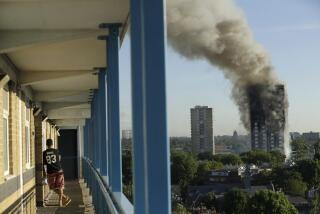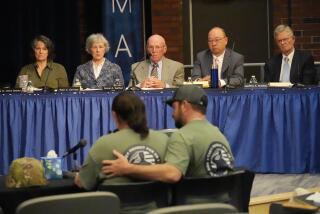Investigators see ‘culture of complacency’ behind gulf oil spill
- Share via
Reporting from Washington — A stream of evidence shows that “a culture of complacency” rather than a “culture of safety” prevailed at BP, Transocean Ltd. and Halliburton as they worked on the ill-fated Deepwater Horizon drilling rig, according to the chairmen of the presidential commission investigating the oil spill in the Gulf of Mexico.
The panel’s investigators uncovered “a suite of bad decisions,” many still inexplicable, involving tests that were poorly run, alarming results that were ignored, proper equipment that was sidelined and safety barriers that were removed prematurely at the high-pressure well, said William K. Reilly, who is co-chairman of the commission with former Democratic Sen. Bob Graham of Florida.
“Each company is responsible for one or more egregiously bad decisions,” said Reilly, who was an administrator of the Environmental Protection Agency under President George W. Bush.
Graham agreed. “Leaders did not take serious risks seriously enough and did not identify a risk that proved to be fatal,” he said.
Their blunt assessments Tuesday came a day after the panel’s chief counsel said he had found no evidence that BP and other workers “made a conscious decision” to cut corners on safety to save money.
“They didn’t rule out cost, just said they weren’t prepared to attribute mercenary motives to men who cannot speak for themselves because they are not alive,” Reilly said of the panel’s investigators and the 11 workers who were killed when the drilling rig exploded and sank on April 20. “But the story they told is ghastly: one bad call after another.”
He said the story that has unfolded so far indicated the need for “top to bottom” reform of the companies.
Created by President Obama a month after the Deepwater Horizon explosion, the commission is investigating the disaster and developing recommendations for preventing oil spills and cleaning them up. Its final report is due in January and its recommendations could be the basis of new laws or regulations.
During Tuesday’s hearing, panel investigators questioned industry experts who have studied decisions made on the Deepwater Horizon.
“I know that there was pressure on this group of people to get done and move on,” said Steve Lewis, an advanced drilling technology engineer at Seldovia Marine Services, who said he had often worked with BP. “I have seen internal communication at senior BP management level inquiring whether this well would be done on time.”
Testimony at other hearings has detailed the time and financial pressures BP faced while trying to finish at the well, which BP staff members had called a “nightmare.” Drilling was six weeks behind schedule, costing BP at least $21 million in leasing fees alone.
When the explosion occurred, BP was temporarily plugging the well to defer oil and gas production and move the rig to another site. During questioning by panel lawyers, industry experts said BP made an “unusual number” of changes to the plan to plug the well in the week before the explosion. They also said that a crucial test to determine pressure in the well was improperly done.
Investigators said Monday that BP and Transocean staff members on the rig ran pressure tests on the well several times on the evening of April 20. A successful test would have shown no upward pressure, but the tests the team ran showed otherwise.
For reasons still not entirely clear, the team declared the test a success at 8 p.m. The rig exploded about two hours later.
More to Read
Sign up for Essential California
The most important California stories and recommendations in your inbox every morning.
You may occasionally receive promotional content from the Los Angeles Times.














